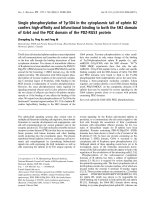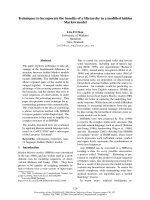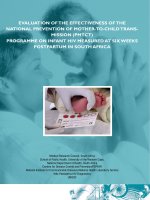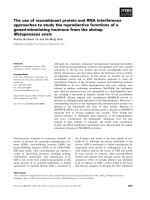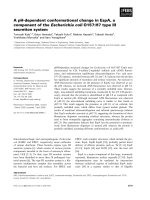From presentation to debate: the change in the national assembly of Vietnam
Bạn đang xem bản rút gọn của tài liệu. Xem và tải ngay bản đầy đủ của tài liệu tại đây (413.64 KB, 12 trang )
<span class='text_page_counter'>(1)</span><div class='page_container' data-page=1>
78
ASIAN CONSTITUTIONAL LAW: RECENT DEVELOPMENTS AND TRENDSFROM PRESENTATION TO DEBATE:
THE CHANGE IN THE NATIONAL ASSEMBLY OF VIETNAM
<b> Professor Nguyen Dang Dung, Nguyen Thuy Duong</b>
School of Law, Vietnam National University, Hanoi
<b>Abstract</b>
By analysing the change in the parliamentary activities of the Vietnam National Assembly since its
establishment (1946), the authors state that before “Doi Moi” (Innovation, 1986), National Assembly
<i>of Vietnam‘s activity in congress was mainly “presentation” (tham luận), in which the selected </i>
delegates present (often reading) the ideas that they have prepared beforehand about the issues
raised at the parliament, in order to illustrate and explaine related guidelines and policies of the
Communist Party. Since Doi Moi, the parliamentary activity of the Vietnam National Assembly has
increasingly shifted from “presentation to debate”. Besides achievements, the National Assembly
also faces certain difficulties in this regard. In this paper, the authors assess the changes in National
Assembly’s activities since Doi Moi as well as pointing out challenges in order to recommend
solutions to solve these problems.
<i><b>Keywords: Innovation; Debate; Presentation.</b></i>
<b>1. The parliamentary activity of the Vietnam National Assembly before Doi Moi (1986) </b>
Similar to other developing countries, although not being called “Parliament”, the National
Assembly of Vietnam has two basic forms of activity: plenary sessions with the participation of all
members, and sessions of the specialized agencies which are committed. The plenary session is called
the official session to pass decisions of the National Assembly. The meetings of the committees are
workshops for products of the National Assembly. In Vietnam, delegates do not operate on a regular
basis, but must hold other main tasks, so the basic functions of the National Assembly can only be
resolved in the plenary session which are meetings. The meeting session is the basic form of operation
of the Vietnam National Assembly, including consecutive meetings held to resolve an agenda. These
sessions are held twice a year: one in the middle of the year and the other at the end of the year, so the
idiom of the National Assembly is the “two terms in spring and autumn”.1
Basic meetings of the National Assembly before Doi Moi are usually in very short-term, about 2-3
days, often in order to review reports and to pass laws drafted by central state agencies: Government,
1<sub> The end of the year is usually held at the end of the winter, November or December. The mid-year is held in summer </sub>
</div>
<span class='text_page_counter'>(2)</span><div class='page_container' data-page=2>
79
<b>PART 2 - PUBLIC LAW IN VIETNAM: COMPARATIVE CONTEXTS </b>
Standing Committee of the National Assembly, the People’s Supreme Prosecute and the People’s
Supreme Court.
Based on consensus principle, and the requirements of concentration completely for the
independence struggle and the concentrated economy, the drafts of central agencies were submitted to
be approved by the National Assembly, almost all delegates did not discuss anything more. The drafts
were approved by enthusiastic applause. The National Assembly is thus an institution that shows the
unified determination to implement well-prepared and thoughtful guidelines and themes of central
agencies under the leadership of the ruling Communist Party. After listening to the drafts of the report,
delegates vote by clapping their hands. The rest of the National Assembly spends most of their time
on the presentation of delegates. Most of the papers were presented by the heads of departments or
central agencies and local provinces and cities by reading a prepared document.
The main content of these presentations is to report their achievements, and to ask the central
government to take measures to support them when facing difficulties. The delegates listened and
ratified by applause without any further discussion and no voting. In the Memorandum of National
Assembly document, Nguyen Nhu Du, former Director of the Summary Department of National
Assembly Office and State Council recalls:
<i> “From the 7th<sub> term onwards, at the National Assembly plenary sessions in the hall, the delegates </sub></i>
<i>often read the pre-written papers. The speeches often raise the characteristics of the situation with </i>
<i>the advantages and the disadvantages... of localities or sectors, analysing a number of issues, then a </i>
<i>number of general or specific recommendations for the locality and the sector. Although these papers </i>
<i>gave National Assembly information of local and sector situation, they were not focusing on the </i>
<i>critical issues that the National Assembly needs to consider and decide on the meeting term because </i>
<i>each representative presented different content.”</i>1
In the 80s of the last century, Doi Moi was launched and changed the mindset of delegates. The
decisions of the National Assembly were approved by the simple form of raising hands, replacing the
applause. At that time, the National Assembly was considered a major military-people meeting with
the main mission of implementing the prepared decisions of the leading Party without any discussion
<i>and debate. This behaviour of “hands-on” was continued even after the end of the Vietnam war and </i>
the centrally planned economy period.
After Doi Moi, not all the time decisions issued by the National Assembly are approved by
all delegates. At that time, the counting of votes was just beginning. In the beginning, officers who
supported the National Assembly Office were arranged to count the votes by counting the
raised-up hands of delegates. With about 500 delegates, this simple counting was not exact sometimes.
Therefore, the National Assembly Office decided to install an electronic counting system.2
<b>2. The parliamentary activity of the Vietnam National Assembly after Doi Moi (1986) </b>
The renovation of National Assembly activities was carried out on a large scale, from the content
of the operating method of the plan, the way and the regime of working... Right from the beginning of
</div>
<span class='text_page_counter'>(3)</span><div class='page_container' data-page=3>
80
ASIAN CONSTITUTIONAL LAW: RECENT DEVELOPMENTS AND TRENDSthe renovation, a specific issue is raised: if there was a necessity for the National Assembly’s opening
speech session.
Up to now, it had become a common practice: at the conferences, seminars, and exchange of
ideas program, there has always been an opening speech. Following that trend, the National Assembly
is such an important event that it must have an opening speech. In the beginning of the Doi Moi
period, many opinions stated that the meeting had a general agenda, detailed agenda, there were quite
detailed materials presented about the issues related to the sessions in the meeting of the National
Assembly delegation heads1<sub> and fully informed to all the delegates... it is not necessary to have an </sub>
opening speech. This proposal is exchanged, discussed and tested immediately at the second term
of the National Assembly 8th<sub>. Unlike the previous terms, at the first plenary session of the meeting, </sub>
National Assembly Chairman Le Quang Dao monitored and performed the agenda of the meeting
without reading an opening speech.
After this event, there were contradictory opinions, the National Assembly meeting would be
less formal without an opening speech, even though the delegates had a lot of documents but they
were still internal documents of the National Assembly, not yet publicized for the people to review.
Discussing again and again after that, the opening of the National Assembly meetings was restored.2
At early the 8th<sub> National Assembly, under the pressure of innovation, leaders of the National </sub>
Assembly, the State Council and a number of National Assembly deputies proposed to replace speeches
on the localities’ and the sector unit’s achievements by speeches on the major issues mentioned in
the group discussions so that the National Assembly delegates could have more focused and deeper
opinions. This idea was enthusiastically accepted by the National Assembly and was implemented
immediately from the second term of the National Assembly 8th<sub>. Thus, the economy, society, state </sub>
budget, management and administrative organization of the state... were discussed at the plenary
meetings. That change has created a practical and focused way of working, evoking issues that need
to be debated and becoming more effective.
The requirements of reformation were getting higher and higher, the agenda content of the
National Assembly was increasing, the time of the National Assembly meetings was lengthening and
accordingly the issues for discussion at the meetings also required delegates to have the responsibility
of studying and making recommendations for further improvement of the Agenda for the National
Assembly to make considerations and decisions.
Based on that request, during the preparation of the fourth meeting in late 1988, the Office of
the National Assembly and the State Council (Collective Head of State - model of socialist countries)
had the initiative of holding the meetings to discuss issues under the thematic topics. Following this
initiative, after listening to the reports of the Council of Ministers (Government-Executive) and the
concerned agencies, the Council of the Nation and the committees make regular presentations, the
teams still meet, but do not discuss, instead just mention the problems that should be discussed in
general. Issues of discussion groups are arranged and discussed further in the topics in the
sub-unit. Each unit is chaired by a standing committee. Based on the requirements for the contents of
1<sub> Head of the National Assembly delegation is the head of the local elected parliamentary delegation: 63 chief delegates </sub>
- 63 delegates elected from the province and equivalent unit.
</div>
<span class='text_page_counter'>(4)</span><div class='page_container' data-page=4>
81
<b>PART 2 - PUBLIC LAW IN VIETNAM: COMPARATIVE CONTEXTS </b>
the meeting term and on their ability to contribute, the National Assembly delegates registered to
participate in the subcommittees. On the basis of discussions in the subcommittees, the committees
will summarize and select the issues that had different opinions to discuss and debate at the hall.
This initiative has been accepted by the leaders of the National Assembly and National Assembly
agencies. Chairman of the State Council Vo Chi Cong also emphasized: Discussing thematic
sub-committees can solve the problem more quickly and deeply, even though there were still disadvantages
that need to be made to draw experience.1
The leaders of the National Assembly, first of all the Chairman of the National Assembly, has an
equally difficult responsibility, on the one hand, to ensure the principles of democratic centralism, but on
the other hand, to promote democracy for all members of the National Assembly who at first was very
“afraid” to argue in the parliament but now dare to speak the truth. In many discussions at the Hall of
the National Assembly, Chairman Le Quang Dao stated that he could catch the opinions of people and
cleverly found similarities of ideas to conclude, ending the debate in time, with agreement of everybody.2
In the early years of the reform situation, the National Assembly had successfully participated
in solving many difficult problems, such as creating a uniform price level, abolishing the stamp
regime without disturbing prices. The sensitivity of the head of the National Assembly had partly
been achieved to the level of creativity in many legislative decisions, on supervision, on monitoring
the implementation of the budget,...
In particular, after the death of the Chairman of the Council of Ministers Pham Hung, the official
Central Committee of Vietnam Communist Party introduced a Politburo member, Mr. Do Muoi, to
the National Assembly to hold the position of Chairman of the Council of Ministers. Although it
did not deny a candidate recommended by the Party, there was some recommendations for Mr. Vo
Van Kiet, a member of the Politburo, to be a candidate for this position. This idea was supported
by a majority of South Vietnamese regional delegates. Complying with the executive leadership of
the Party, Mr. Vo Van Kiet withdrew, but with many opinions of the deputies still does not let Mr.
Vo Van Kiet withdraw from the list of candidates. The President of the National Assembly clearly
encountered a very delicate and difficult situation. It is true that the country is in need of an executive
who has the ability to turn over the situation and have high trust. However, no one could bring the
difference immediately. In addition, it must ensure the leadership principle of the Party and not being
detrimental to the spirit of Innovation. After a very sincere discussion, with the consent of the Party
leader, the National Assembly chairman made a rare decision in its history, endorsing the list of
both candidates for the Position of Chairman of Ministers Council. The list of both candidates had
shown the democratic spirit of the National Assembly. With a higher number of votes, Do Muoi is the
Chairman. And then Vo Van Kiet was also introduced as Vice Chairman of the Ministers Council.3
Although the Law on Organization of the National Assembly clearly states that the National
Council and Committees of the National Assembly, and National Assembly deputies, have the right to
1<sub> Ibid. 58- 59.</sub>
2<sub> Nguyen Tai, You always find the same idea in different opinions / Le Quang Dao (1921-1999) (People’s Army </sub>
Publishing House 2000).
3<i><sub> Vu Dinh Cu, Mr.Lê Quang Đạo and Doi Moi/ Lê Quang Đạo (1921 - 1999) (People’s Army Publishing House, 2000) </sub></i>
</div>
<span class='text_page_counter'>(5)</span><div class='page_container' data-page=5>
82
ASIAN CONSTITUTIONAL LAW: RECENT DEVELOPMENTS AND TRENDSsubmit bills, for most later terms, no one has exercised that right which have been stipulated by law1<sub>. </sub>
Only in the 8th<sub> National Assembly did a delegate presented a bill. It was delegate Huynh Ngoc Dien </sub>
from Ho Chi Minh City, who submitted a bill on agricultural land use tax. Although it had not been
approved, it was also a rare case in the activities of the Vietnam National Assembly.
With the purpose of allowing delegates of different provinces and agencies to directly hear each
other’s opinions, in the fifth termination meeting of the 11th National Assembly, the Presidium has
made some improvements in controlling the meeting to be less time-consuming. The discussion at
the Hall is more than the time for delegates to discuss and discuss at the team and the group. Because
of the limited time, most delegates made a brief statement, going straight to the heart of the problem,
even with conflicting opinions. Meeting on the afternoon of May 28, 1994, the National Assembly
discussed the bill of the Labour Code, the 30th<sub> and last speaker of the meeting, but still attracted the </sub>
attention of the whole Hall, the delegate Cu Hoa Van, delegate from the Lao Cai Province. Many of
the delegates who spoke beforehand suggested increasing the number of days of the year for workers.
Delegate Cu Hoa Van said only rustic words:
<i>“Our country is still poor, we have been doing a lot of work to eradicate hunger and reduce </i>
<i>poverty, to achieve the goals of rich people, a strong nation, fair and civilized and democratic </i>
<i>societies. So we have to work harder to be happy. If we increase the holidays but the conditions have </i>
<i>not been met, how can we get rich faster,...”</i>
The delegate had just finished speaking, the whole audience responded with joy.2
During the Doi Moi period, many projects, many bills were only passed by the National Assembly
with certain adjustments according to the opinions of the delegates, and there even was a bill approved
by the National Assembly with different contents from the Proposal of the Government. This is a
highlight for the enhanced power of the National Assembly. But this is also the cause of the reduction
in actual law enforcement. Because of the fact that the policy guidelines of the law are proposed by
the delegates themselves, the National Assembly has not been well prepared, because of the lack of
assessment of the impact of policy advocates proposed by the deputies.3
Not only adjusting the drafts, for the first time in history, the National Assembly of Vietnam did
not approve a Proposal submitted by the Government. In June 2010, the North-South High Speed
Railway project of the Government with a total investment of US$ 56 billion was placed on the
National Assembly agenda, but it was abolished by the National Assembly.
Also in the last 4 terms, monitoring has also made important progress. On average, in each term, the
National Assembly heard and discussed nearly 100 reports of the President, the Government and members
of the Government, the People’s Supreme Prosecute and the People’s Supreme Court. The Standing
Committee of National Assembly has about 60 Meetings each term, in addition to preparing bills and
approving ordinances, listening and discussing more than 80 reports of Government agencies, Supreme
People’s Court and People’s Supreme Prosecute... On average during a term, the Standing Committee of
1<sub> Mai Thuc Lan, Impressions about the term of the National Assembly VIII / Memories of the years (Memorandum of </sub>
officials of the National Assembly Office) (National politics Publishing House, 2006) 106 -107.
2<sub> Ha Anh, Take notes about a meeting. Memories of May (Memories of the National Assembly Office staff) (National </sub>
politics Publishing House 2006) 184 -185.
</div>
<span class='text_page_counter'>(6)</span><div class='page_container' data-page=6>
83
<b>PART 2 - PUBLIC LAW IN VIETNAM: COMPARATIVE CONTEXTS </b>
National Assembly, the National Council, the Committees of the National Assembly carry out more than
200 monitoring missions in localities and establishments throughout the country. The content of supervision
is rich and diverse, including economic, cultural, social, defence and security issues.... All delegations spend
a lot of time in direct contact with the people, listening to the expectations and recommendations of the
people. Through contact with voters before and after each meeting, thousands of comments were synthesized
and explained, focusing on pressing issues such as spreading investment and loss in capital construction, the
planning and use of land, receiving citizens’ complaints, handling big corruption cases, etc.
The questioning and answering sessions at the meetings had a striking step. From the 3rd session
(September 1998), the 10th National Assembly, the questionnaires were broadcasted and broadcasted
live on Vietnam Television and Voice of Vietnam radio stations. From the 11th National Assembly,
some important discussions were also broadcasted and broadcasted live.
During the National Assembly Meetings, debates, discussions, decisions for the country’s
problems took place excitingly, richly and comprehensively. The proportion of votes cast in the
National Assembly votes is publicized at the meeting. The above activities contribute to creating
new vitality in the activities of the National Assembly, meeting the need to monitor and inspect and
supervise of voters and people. However, the National Assembly’s surveillance activities are still
heavy in form, not to mention a one-year delegation that does not hold any supervision. The rate
of monitoring proposals is not high. Some issues were proposed by the National Assembly, but the
authorities and the ministries only promised without implementing or performing thorough.
The term of the 8th<sub> National Assembly also marked a historical milestone when for the first time </sub>
in its history, National Assembly conducted a vote of confidence for those elected or ratified by the
National Assembly. The vote of confidence has been implemented carefully, seriously, in accordance
with the content, process and procedures specified in the Resolution of the National Assembly and
guidelines of the Standing Committee of the National Assembly. The whole process of taking votes
of confidence is done in a democratic, public and transparent way for public opinion and national
voters to monitor and supervise. With their responsibility, the National Assembly deputies took the
time to study, capture information, discuss and evaluate in a cautious, objective and attentive way
the trust level of the members taken by the National Assembly vote of confidence. The results of
the vote of confidence of the National Assembly have truly reflected the socioeconomic situation,
national defence, security, foreign affairs and judicial activities of the country and are also a source of
information and evaluation to help each person, they can get a vote of confidence to see their credibility
to continue striving, training their qualities, improving their capacity and working efficiency. But
until now the issue of confidence vote had not had the desired results.
At the end of each term or mid-term, all the titles, both executive and legislative, are voted by
the National Assembly with three levels of high trust, trust and low trust. Then people with low trust
can be voted unconvincingly by the National Assembly.
</div>
<span class='text_page_counter'>(7)</span><div class='page_container' data-page=7>
84
ASIAN CONSTITUTIONAL LAW: RECENT DEVELOPMENTS AND TRENDS<b>3. Milestones from implementing innovations in National Assembly performance</b>
The 3rd<sub> meeting of the 14</sub>th<sub> National Assembly officially opened on 22 May 2017. This meeting has </sub>
some very noticeable improvements. From the preparation for the third meeting of the 14th National
Assembly, it can be seen that Vietnamese legislators are aiming to build a parliament that is more
and more responsive to voters’ expectations by strengthening dialogue, debate between delegates and
members of the Government, including the Prime Minister. The 3rd meeting of the National Assembly
continues to have important innovations and improvements, the National Assembly has arranged a
more reasonable agenda, giving adequate time for the content of discussions at the conference on the
implementation of the task.
After a month of working with a serious and responsible spirit, the 14th<sub> National Assembly </sub>
has completed the Agenda of the 3rd meeting. At this meeting, the legislative work continues to
be determined as a central content by the National Assembly. National Assembly has spent most of
its time reviewing, enacting 12 laws, 12 resolutions and commenting on 6 other law projects to be
continued to improve. Besides voting through well-prepared bills, the National Assembly has decided
to re-prepare unprepared bills, for example the National Law Planning.
The most exciting part is the part of discussion on the Government’s Socioeconomic Report. The
National Assembly listened to the Government report on the results of implementing socioeconomic
tasks in 2016 and the implementation of tasks in the first months of 2017. On the basis of listening
to comments and recommendations and through practical activities, the National Assembly delegates
enthusiastically expressed many opinions, debates, comprehensive and profound analysis of the
socioeconomic situation in 2016 and the first 6 months of 2017.
Discussion of the Government report on the socioeconomic situation in the first 6 months of
2017 is a very special session of the National Assembly of socialist countries, including the State
of Vietnam. For the first time, the National Assembly of Vietnam, worked continuously until 18:30
o’clock, instead of only until 17:00 as usual. With this schedule, not just for the time being chosen, a
common working principle of many parliaments around the world. Not even a few parliaments work
overnight, once the problem is not resolved. The unusual thing about the National Assembly is that
when discussing the socioeconomic situation, the majority of the National Assembly deputies needs
to read the written speeches. This is not the usual way of doing business in parliaments in developed
countries. The parliament in French is “Parlement” in English “parliament” which means “to say”.
The most exciting debate part is the part of the Ministers’ response to questions and direct
dialogue between delegates and Ministers. During the questioning session in the morning of June
15, 2017, many delegates continued to debate with the explanation of the Minister of Planning and
Investment. This is the questioning session, which is the most questioned by many delegates from the
localities. About 50 participants asked questions and 19 delegates repeatedly questioned the Minister
after each explanation. The content of the question focused on the slow disbursement of local public
investment has directly affected the country’s economic growth, while state capital is in surplus. It is
a hot problem happening now in Vietnam.
</div>
<span class='text_page_counter'>(8)</span><div class='page_container' data-page=8>
85
<b>PART 2 - PUBLIC LAW IN VIETNAM: COMPARATIVE CONTEXTS </b>
and Decrees No.15 and No.30 of the Government, or questions about whether or not to apply for
funding of local projects.
The new point of the debates at this 3rd meeting is illustrated at: the debate sessions of the
delegates are broadcasted on social media to help people follow the content of the debate, making
policies advocated directly to the people. Many social organizations are also requested by the National
Assembly to contribute their opinions directly to its documents that are being heard and debated. For
example, the participation of Vietnam Bar Association with the provisions of the Criminal Code.
Assessing this change, Mrs. Nguyen Thi Kim Ngan - Chairwoman of the National Assembly said:
<i>“The atmosphere of discussion and debate at a lively and frank meeting showed the change </i>
<i>from the National Assembly for discussion to the National Assembly for debate with a considerable </i>
<i>number of arguments, and the quality of speech was also enhanced. National Assembly deputies are </i>
<i>not only actively debating with members of the Government, but also debating with other delegates </i>
<i>about issues with different opinions. The Ministers directly explained, seriously receiving opinions </i>
<i>in the process of discussing bills, resolutions and reports... which created a democratic, responsible, </i>
<i>constructive working atmosphere, contributing to improving the quality of meetings”.1</i>
<b>4. Challenges in transition from “presenting” to a “debating” Parliament</b>
Based on the above analysis, we can easily see that the transition from Parliamentary discussion
to debate in Vietnam is now facing many challenges. And it takes time to change step by step. For
example, it takes time to conduct open speeches in the National Assembly, or to conduct seminars on
sensitive issues of subcommittees or to determine the relationship between the National Assembly
and the Government.
There are many reasons for these challenges. The first reason is that there has not been a tradition
or in other words there is no parliamentary culture. The influence of the wartime regime, then followed
by the planned concentration period, still had great influence in all corners of life, including the
activities of the National Assembly as a body of supreme state authority. For a long period in the
history of the organization and operation of the state apparatus, the National Assembly has always
been seen as a place to have a heavy responsibility in institutionalizing policies and guidelines of
the country’s leading agency - the Communist Party of Vietnam, which does not necessarily have to
discuss... Although in the spirit of the reform process, the Communist Party and State have advocated
criticisms of the proposed project before the National Assembly, but those guidelines do not have
specific measures attached, along with the habits formed in many years, it is not easy to turn that
proper policy into reality.
Debate is a privilege of delegates within the framework of the legislative body. As a parliamentary
body, the quality of debate depends on many elements. Basically, these problems depend on the
quality of the delegates. Delegates must have debate skills, must have debate experience, information
processing skills... And must first be able to create an environment for debate. It is the delegate who
cannot concurrently hold titles contradicting parliamentary activity: for example, civil servants in the
executive and judiciary apparatus should not concurrently hold the delegate’s job. In this case, the job
of National Assembly delegates not only becomes a part-time job, but it also hinders their main job.
</div>
<span class='text_page_counter'>(9)</span><div class='page_container' data-page=9>
86
ASIAN CONSTITUTIONAL LAW: RECENT DEVELOPMENTS AND TRENDSDue to the influence of the thinking of the economy, focusing on subsidized plans, many people in
the executive, judicial, army and police apparatus were elected as part-time delegates. Similar to this
statement, on the 2013 Constitution of the Socialist Republic of Vietnam by the Legislative Research
Institute under the Standing Committee of the National Assembly, writes:
<i>“Our National Assembly does not operate regularly, so the majority of delegates are delegates </i>
<i>who concurrently hold positions in the party apparatus, government, social organizations and </i>
<i>businesses. This duality is necessary, but should only be at a suitable scale to overcome confusion on </i>
<i>the role of delegates and officials.”</i>
“Practice is much better than theory” is Vietnamese precious idiom. But unlike other professions,
the National Assembly delegates exercise the power of the people. Being influenced by the theory of
Marxism and Leninism, delegates of the National Assembly are often selected among state officials
in the state apparatus from legislative or executive or judicial branch.
In other developed democratic countries, their National Assembly delegates are very attached
to their electorate. To win competitive elections, parties often have to send their best candidates
to run for elections and the voters always support the candidates they deem most deserving. So
experienced, talented, and attached candidates to the electoral district always have the opportunity
to win the election..
Becoming a representative is not easy. The candidates have to go through many rounds of
selection, but being a delegate after being elected is not difficult, because it is not a statement,
not a debate in the Parliament. The results of the elections of National Assembly deputies for the
XII, XIII sessions show that, in terms of structure, National Assembly deputies must ensure the
composition of gender, ethnicity, geography, and occupation..., but in terms of quality of delegates,
the long-standing conflict has not been overcome, if it is more structural, it is difficult to ensure the
quality of delegates, or vice versa. The key to the problem lies in the current method of election of
deputies to the National Assembly.
In addition to the above issues and many other issues related to the way of operating, the
behaviour of all delegates on the National Assembly session could not form a Code of Conduct of
delegates of parliamentary bodies and National Assembly leaders, in countries with parliamentary
culture often referred to as Parliamentary Law. These laws are rules that regulate the modalities, ways
of debate, how to raise and accept the issue and the way of voting of organizations with members
who have equal rights, but to win those the right decision does not necessarily have to be clever in the
way of the chairman of the National Assembly analysing the above. Although the provisions of the
Constitution, the Law on Organization of the National Assembly together with the documents under
the law stipulate that the internal rules of the National Assembly and the regulations of the National
Assembly delegates have been issued, but only the provisions. Basically, it is impossible to elaborate
and help the member delegates and the controller to handle all situations of debate in the parliament.
</div>
<span class='text_page_counter'>(10)</span><div class='page_container' data-page=10>
87
<b>PART 2 - PUBLIC LAW IN VIETNAM: COMPARATIVE CONTEXTS </b>
National Assembly, with the awareness that the Committees were to be the “factory” of the National
Assembly, the Standing Committee of the National Assembly proposed the establishment of two more
Committees, but they were not approved. Because the person who presided over the plenary session
of the meeting was disproportionate to the amount of time for both parties to speak: supporters and
protesters, most of the time allocated to discussing the issue was almost won by those who do not
support. With a very sharp reason, the state is currently advocating to reduce the budget deficit. The
right decision was missing, until the XIII term with the vote of the above-mentioned progressive
decision became a reality, passed by the National Assembly.
And the last point is the practical result of the debate. Although the debates may be very exciting,
but the outcomes cannot be seen immediately. It takes time to change the viewpoints of delegates and
the people. This problem has not really been solved by the National Assembly until now. The voting
to withdraw the Draft of Law on 3 special zones of Van Don, Bac Van Phong and Phu Quoc with the
overwhelming ratio of 423/432 is a unique situation in the operation of the Vietnam National Assembly
since the beginning of reforming from the National Assembly for discussion to become a National
Assembly for debate. This is also one of the basic causes leading to many difficult socioeconomic
problems of Vietnam to be solved slowly, and must be repeated in many sessions and meetings of the
National Assembly.
To enhance the debating function of the National Assembly is the responsibility of all delegates.
They not only have to be open-minded, but also have to hold accountabilities for their opinions in
the meetings. Besides, information about the National Assembly debate must be accessed by the
public except for information related to imperative circumstances for the reasons of national defence,
national security, social order and security, social morality and community well-being according to
<b>Article 14.2 of the 2013 Constitution. </b>
<b>Conclusion</b>
The National Assembly is a parliamentary branch through which people exercise their power in
order to implement legislative. In order to become a truly effective agency, the National Assembly
must be a debating organ. Due to various objective and subjective conditions, the war of fighting
for independence, and then the economic concentration period, the Vietnam National Assembly has
been just a parliamentary speech, illustrating for prepared drafts and bills of state agencies. Now with
the innovation by building a socialist-oriented market economy, the National Assembly also has to
gradually change to a “debate” function in order to be constructive in making laws.
<b>References</b>
60 years Vietnam’s National Assembly of the National Assembly Office. Publisher. National politics
H. 2005
Chairman of the National Assembly: Positive debate of the delegates, Minister explained seriously /
People’s mind June 21, 2017
</div>
<span class='text_page_counter'>(11)</span><div class='page_container' data-page=11>
88
ASIAN CONSTITUTIONAL LAW: RECENT DEVELOPMENTS AND TRENDSConscience and responsibility of people’s representatives and Capital Security on November 3, 2018
Mai Thuc Lan: Impressions about the term of the National Assembly VIII / Memories of the years
(Memorandum of officials of the National Assembly Office). Publisher. National politics 2006
Nguyen Nhu Du: Recalling a journey / Memories in May. Publisher. National Politics Hanoi 2008.
Nguyen Si Dung: Discussing the National Assembly and the challenges of the concept, National
Political Publishing House facts H. 2017
Nguyen Si Dung: Legislative process issues. Tia Sáng August 2, 2016
Nguyen Tai Dao: You always find the same place in different opinions / Le Quang Dao (1921-1999)
Publisher. People’s Army 2000
Data on the composition of Vietnam’s National Assembly / Representative functions of the National
Assembly in the rule of law state. Publisher. People’s Police H. 2008
National Assembly - 70 years of establishment and development. National Political Publishing House
H. 2015
Reboot North-South high-speed rail: Legitimate concern. Vietnam Land September 15, 2016
Standing Committee of the National Assembly - Legislative Research Institute: Constitution of the
Socialist Republic of Vietnam in 2013 and legislative achievements in the term of the National
Assembly XIII. Publisher. National politics H. 2016
Vu Dinh Cu: Dong Le Le Dao and renewal / Le Quang Dao (1921-1999) Publisher. People’s Committee 2000.
Vu Dinh Cu: Dong Le Le Dao and innovation / Le Quang Dao (1921-1999) Publisher. People’s
Committee 2014.
Vu Duc Khiem: Let the National Assembly really be the highest state authority, the highest
representative body of the people.
</div>
<span class='text_page_counter'>(12)</span><div class='page_container' data-page=12>
Thank you for evaluating AnyBizSoft PDF Splitter.
A watermark is added at the end of each output PDF file.
To remove the watermark, you need to purchase the software from
</div>
<!--links-->
Tài liệu Báo cáo khoa học: From heart to mind The urotensin II system and its evolving neurophysiological role ppt
- 9
- 785
- 0
